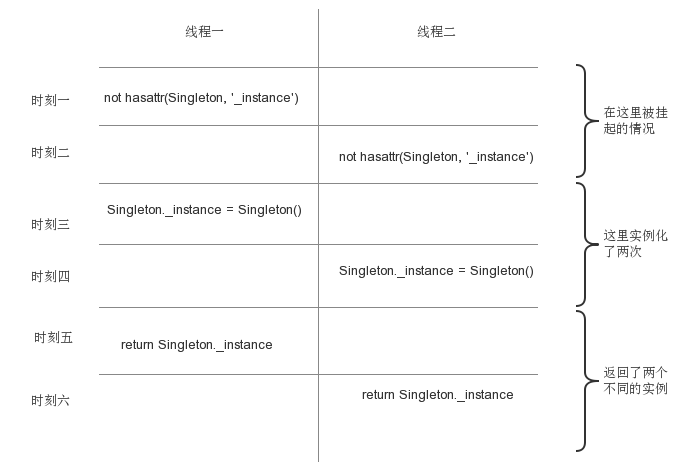单例模式 保证一个类仅有一个实例,并提供一个访问它的全局访问点。
来看看tornado.IOLoop中的单例模式:
class IOLoop(object):
@staticmethod
def instance():
"""Returns a global `IOLoop` instance.
Most applications have a single, global `IOLoop` running on the
main thread. Use this method to get this instance from
another thread. To get the current thread's `IOLoop`, use `current()`.
"""
if not hasattr(IOLoop, "_instance"):
with IOLoop._instance_lock:
if not hasattr(IOLoop, "_instance"):
# New instance after double check
IOLoop._instance = IOLoop()
return IOLoop._instance为什么这里要double check?
简单的单例模式
先来看看代码:
class Singleton(object):
@staticmathod
def instance():
if not hasattr(Singleton, '_instance'):
Singleton._instance = Singleton()
return Singleton._instance在 Python 里,可以在真正的构造函数__new__里做文章:
class Singleton(object):
def __new__(cls, *args, **kwargs):
if not hasattr(cls, '_instance'):
cls._instance = super(Singleton, cls).__new__(cls, *args, **kwargs)
return cls._instance这种情况看似还不错,但是不能保证在多线程的环境下仍然好用,看图:
 出现了多线程之后,这明显就是行不通的。
出现了多线程之后,这明显就是行不通的。
上锁使线程同步
上锁后的代码:
import threading
class Singleton(object):
_instance_lock = threading.Lock()
@staticmethod
def instance():
with Singleton._instance_lock:
if not hasattr(Singleton, '_instance'):
Singleton._instance = Singleton()
return Singleton._instance这里确实是解决了多线程的情况,但是我们只有实例化的时候需要上锁,其它时候Singleton._instance已经存在了,不需要锁了,但是这时候其它要获得Singleton实例的线程还是必须等待,锁的存在明显降低了效率,有性能损耗。
全局变量
在 Java/C++ 这些语言里还可以利用全局变量的方式解决上面那种加锁(同步)带来的问题:
class Singleton {
private static Singleton instance = new Singleton();
private Singleton() {}
public static Singleton getInstance() {
return instance;
}
}在 Python 里就是这样了:
class Singleton(object):
@staticmethod
def instance():
return _g_singleton
_g_singleton = Singleton()
# def get_instance():
# return _g_singleton但是如果这个类所占的资源较多的话,还没有用这个实例就已经存在了,是非常不划算的,Python 代码也略显丑陋……
总结
所以出现了像tornado.IOLoop.instance()那样的double check的单例模式了。在多线程的情况下,既没有同步(加锁)带来的性能下降,也没有全局变量直接实例化带来的资源浪费。
6-25 补充(使用 decorator):
https://wiki.python.org/moin/PythonDecoratorLibrary#Singleton
import functools
def singleton(cls):
''' Use class as singleton. '''
cls.__new_original__ = cls.__new__
@functools.wraps(cls.__new__)
def singleton_new(cls, *args, **kw):
it = cls.__dict__.get('__it__')
if it is not None:
return it
cls.__it__ = it = cls.__new_original__(cls, *args, **kw)
it.__init_original__(*args, **kw)
return it
cls.__new__ = singleton_new
cls.__init_original__ = cls.__init__
cls.__init__ = object.__init__
return cls
#
# Sample use:
#
@singleton
class Foo:
def __new__(cls):
cls.x = 10
return object.__new__(cls)
def __init__(self):
assert self.x == 10
self.x = 15
assert Foo().x == 15
Foo().x = 20
assert Foo().x == 20https://wiki.python.org/moin/PythonDecoratorLibrary#The_Sublime_Singleton
def singleton(cls):
instance = cls()
instance.__call__ = lambda: instance
return instance
#
# Sample use
#
@singleton
class Highlander:
x = 100
# Of course you can have any attributes or methods you like.
Highlander() is Highlander() is Highlander #=> True
id(Highlander()) == id(Highlander) #=> True
Highlander().x == Highlander.x == 100 #=> True
Highlander.x = 50
Highlander().x == Highlander.x == 50 #=> True8-27 更:
我认为政治正确的单例模式,见:singleton.py